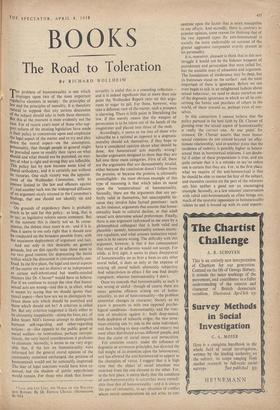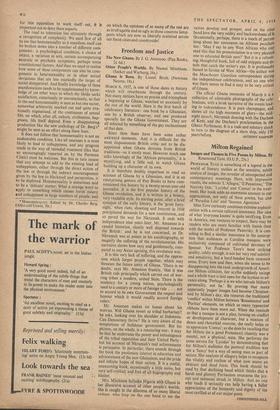BOOKS
The Road to Toleration
BY RICHARD WOLLHEIM THE problem of homosexuality is one which impinges upon two of the most important regulative elements in society: the principles of law and the principles of morality. It is therefore natural to suppose that any serious discussion of the subject should take in both these elements. But this at the moment is most evidently not the ease. For of recent years most of those who sup- port reform of the existing legislation have made it their policy to concentrate upon and emphasise the legal aspect of the matter and to try and play down the moral aspect—on the assumption, presumably, that though people in general might be prevailed upon to modify their views on what Should and what should not be punished, on mat- ters of what is right and wrong they are inflexible. This policy has by now become some kind of liberal orthodoxy, and it is certainly not without its victories. One such victory was the appoint- Ment of the Wolfenden Committee, with its interest limited to 'the law and offences against it'; and another such was the widespread diffusion of an argument nicely attuned to the Committee's findings, that one should not identify sin and crime.
On grounds of expediency there is probably much to be said for this policy : as long, that is to say, as legislative reform seems imminent. But at the moment this is clearly not so. In conse- quence, the debate once more is on : and if it is, then it seems to me only right that it should now be conducted on the broadest possible front, with the maximum deployment of argument and fact.
And not only is this desirable on general grounds, but on this specific issue there seem to me two good reasons for deprecating the limits Within which the discussion is conventionally con- fined. In the first place, the legal and moral aspects of the matter are not as distinct or as independent as certain well-intentioned but woolly-minded thinkers like Dr. Chesser* would have us believe. For if we continue to accept the view that homo- sexual acts are wrong—and this is, in effect, what is meant by saying that we should ignore their moral aspect—then how are we to distinguish be- tween those acts which should be punished and those which should not be? A criterion is called for. But any criterion suggested is likely either to be ultimately inapplicable—along the lines, say, of John Stuart Mill's famous attempt to distinguish between self-regarding and other-regarding actions: or—like appeals to the public good or social welfare—to reintroduce, perhaps surrepti- tiously, the very moral considerations it professes to eliminate. Secondly, it seems to me very argu- able that, if the law on homosexuality were reformed but the general moral opinion of the community remained unchanged, the position of homosexuals would not be noticeably improved. The fear of legal sanctions would have been re- moved, but the shadow of public opprobrium would remain. For those who think that homo-
*, LIVE AND LET LIVE, THE MORAL OF 'ID. WOLFEN- DFN REPORT. By Dr. Eustace Chesser. (Heinemann, 8s. 6d.)
sexuality is sinful this is a consoling reflection— and it is indeed significant that at more than one point the Wolfenden Report rests on this argu- ment to sugar its pill. For those, however, who take a different view of the matter, such a prospect is alarming. There is little point in liberalising the law, if this merely means that the weapon of persecution is to be taken out of the hands of the magistrates and placed into those of the mob. Accordingly, it seems to me that all those who subscribe to a rational as opposed to a dogmatic morality should ask themselves, if they hope to have a considered opinion about what should be done, Are homosexual acts morally wrong? Secular arguments designed to show that they are fall into three main categories. First of all, there are the arguments that arc demonstrably invalid, either because the conclusion doesn't follow from the premiss, or because the premiss is ultimately unintelligible : the most obvious example of this type of reasoning is that which takes its stand upon the 'unnaturalness' of homosexuality. Secondly, there are the arguments that are per- fectly valid in themselves, but unacceptable be- cause they involve false factual premisses: such as, for instance, arguments that assume that homo- sexuality leads to cultural decline, or that adult sexual acts determine sexual preferences. Finally, there is one argument (advanced to me once by a philosophical colleague) that is both valid and plausible: namely, homosexuality arouses instinc- tive repulsion, and what arouses instinctive repul- sion is in its nature wrong. The difficulty with this argument, however, is that it has consequences that many of its adherents would not accept. For while, at first sight, it seems to place disapproval of homosexuality on as firm a basis as any other moral belief, it does so only at the expense of making all moral beliefs ultimately subjective. And subjectivism in ethics I for one find deeply repugnant; whereas homosexuality I don't.
Once we concede that homosexuality as such is not wrong or sinful—though of course there are many genuine offences arising out of homo- sexuality, as out of heterosexuality—the problem somewhat changes in character. Society as we know it presents us with two opposed psycho- logical conditions—homosexuality, and the reac- tion of revulsion against it both deep-seated, both doubtless of infantile origin; the two some- times existing side by side in the same individual, and then leading to deep conflict and misery; but most often distributed across different people, and thus the cause of social stress and persecution.
For centuries society, under the influence of dogmatic or erroneous principles, has directed the full weight of its attention upon the homosexual, and has allowed the anti-homosexual to appear as the champion of virtue. I suggest that it is high time that the object of social attention was switched from the one element to the other. For, in the first place, it seems likely that the condition of anti-homosexuality is somewhat more .remedi- able than that of homosexuality : and it is always the part of rationality, in apy situation of conflict where moral considerations do not arise, to con-
centrate upon the factor that is more susceptible to our efforts. And second)y, there is, contrary to popular opinion, some reason for thinking that of the two opposed types the anti-homosexual is socially the more undesirable on account of the greater aggressive component overtly present in his personality.
It is, moreover, pleasant to think that in this new struggle it would not be the hideous weapons of punishment and persecution that were called for, but the amiable ones of education and argument. The foundations of intolerance may be deep, but its buttresses stand on the surface: and the most important of these is ignorance. Before we can even begin to talk in an enlightened fashion about sexual behaviour, we need to shake ourselves out of the dogmatic ignorance in which we all lie con- cerning the habits and practices of others in the world, of those around us, perhaps even of our- selves.
In this connection I cannot believe that the policy pursued in the best faith by Dr. Chesser of glossing over the sexual aspect of homosexuality is really the correct one. At one point, for instance, Dr. Chesser asserts that most homo- sexual relations do not extend beyond 'an affec- tionate relationship,' and at another point that the incidence of sodomy is possibly higher in hetero- sexual than in homosexual relations. I am doubt- ful if either of these propositions is true, and am quite certain that it is a mistake to say'so unless one is certain that they are. For, in the first place, what we require of the anti-homosexual is that he should be able to master his fear of the subject, and excessive caution on the part of the reformer sets him neither a good nor an encouraging example. Secondly, as a few minutes' conversation with rabid anti-homosexuals so often brings out, much of the neurotic opposition to homosexuality relates to and is bound up with its anal aspects : for this opposition to work itself out, it is important not to deny these aspects.
The road to toleration lies ultimately through a recognition of complexity. We need first of all to see that homosexuality as it manifests itself can be broken down into a number of different com- ponents: a psychological condition, a choice of object, a variation in aim, certain accompanying neurotic or psychotic symptoms, perhaps some constitutional factors. And then we need to realise how some of these components can also be com- ponents in heterosexuality or in other sexual deviations that are less markedly the target of social disapproval. And finally knowledge of these manifestations needs to be supplemented by know- ledge of yet other ways in which the libido seeks satisfaction, consciously or unconsciously, so that in the end homosexuality is seen as but one sector, somewhat arbitrarily marked out and quite irra- tionally stigmatised, of the continuum of sexual life, on which, after all, culture, civilisation, hap- piness, life itself depend. Even a disappointing production like the new anthology of Dr. Berg's* might be seen as an effort along these lines.
It does not follow that homosexuality is not an undesirable condition. Like all neuroses it is most likely to lead to unhappiness, and any progress made in the way of remedial treatment (like that so encouragingly reported on by the Portman Clinic) must be welcome. But this in turn means that any attempt to add to the existing load of unhappiness, either through the direct action of the law or through the indirect encouragement given by the law to blackmail and persecution, is to be deplored. Homosexuality is sometimes said to be a 'delicate' matter. What a strange word to apply to something which causes harsh misery and unhappiness to large numbers of people, and
HOMOSFXUALITY. Edited by Dr. Charles Berg. (Allen and Unwin, 30s.)
on which the opinions of so many of the rest are as irrefragable and as ugly as those concrete lamp- posts which are now so liberally scattered across our finest cities and countryside!































 Previous page
Previous page